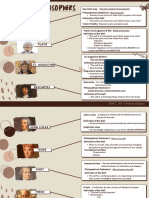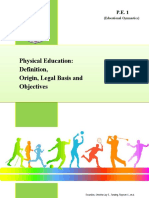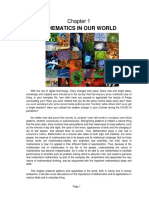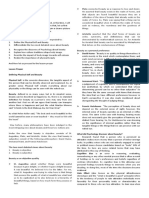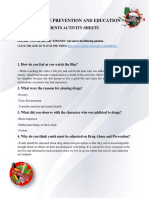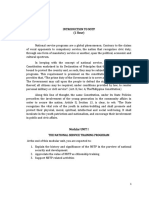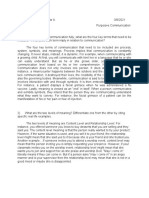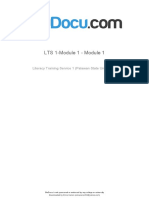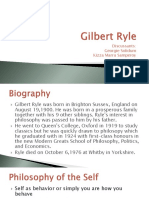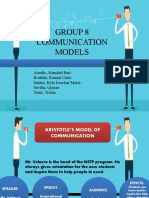Professional Documents
Culture Documents
Paul Montgomery Churchland
Paul Montgomery Churchland
Uploaded by
Brix BugarinOriginal Description:
Original Title
Copyright
Available Formats
Share this document
Did you find this document useful?
Is this content inappropriate?
Report this DocumentCopyright:
Available Formats
Paul Montgomery Churchland
Paul Montgomery Churchland
Uploaded by
Brix BugarinCopyright:
Available Formats
PAUL MONTGOMERY CHURCHLAND
born in Vancouver, Canada on October 12, 1942
a Canadian philosopher and author known for his studies of the brain and
the philosophy of mind.
married to fellow philosopher Patricia Churchland
currently the Emeritus Professor of Philosophy at the University of California,
San Diego.
his research focuses on epistemology, perception, philosophy of cognitive
science, philosophy of mind, philosophy of neuroscience, and philosophy
of science.
PAULS CHURCHLAND’S PHILOSOPHY OF SELF
Churchland holds to eliminative materialism. Stated simply, eliminative
materialism argues that the ordinary folk psychology of the mind is wrong.
It is the physical brain and not the imaginary mind that gives us our sense
of self.
The physical brain and not the imaginary mind that gives us our sense of
self. (which means that our mind and body is different)
Somehow similar to the philosophy of Rene Descartes (“When we examine
ourselves deeply, we will know all about ourselves”)
Also somehow similar to the philosophy of Plato (“The self should have the
body and the soul”)
ANALYSIS
Overall, eliminative materialism means the self is the brain. We always use
our senses to see or feel real situation. Brain as our provider to see, feel,
touch, taste, and smell
Churchland asserted the sense of self is originated from the brain itself and
that self is a product of an electromagnetic signals produced by the
brain.
Eliminative materialism got two parts. Materialism stated that there is only
the brain that mental processes such as remembering, learning, feeling
hungry, feeling dizzy that these states that we’re aware of are actually
states of the physical brain itself. Materialism is the idea that all what we
think of as the mind is something that the brain does. Eliminative means as
the neuroscience develops and as we discover more and more about the
way the physical brain works some of the psychological categories may
not fit very well onto things that we are discovering about the nature of
the brain. Categories such as the will of where you might think of.
There are a whole lot of areas of the brain that cooperate and integrate
when decisions and choices are made.
You might also like
- Introduction To Psychology PDFDocument4 pagesIntroduction To Psychology PDFJames Daniel GarciaNoch keine Bewertungen
- Chapter 1 The National Service Training Program NSTP An IntroductionDocument6 pagesChapter 1 The National Service Training Program NSTP An IntroductionUly Salvador100% (1)
- 1 PhilosophyDocument27 pages1 PhilosophyLuna AdlerNoch keine Bewertungen
- Calites, Ken Dion A. - BSHM 1C - NSTP Module 1Document3 pagesCalites, Ken Dion A. - BSHM 1C - NSTP Module 1Ken Dion Calites100% (1)
- Lesson 1: The Self From Various Philosophical PerspectivesDocument10 pagesLesson 1: The Self From Various Philosophical PerspectivesryanNoch keine Bewertungen
- Debit Card ChallengeDocument5 pagesDebit Card ChallengeFEBUARY MARY ARZAGANoch keine Bewertungen
- WORKSHEET NSTP EditedDocument30 pagesWORKSHEET NSTP EditedHannahbea LindoNoch keine Bewertungen
- Understanding The Self AssignmentDocument2 pagesUnderstanding The Self AssignmentKiana Vren JermiaNoch keine Bewertungen
- Different Philosophers: SocratesDocument3 pagesDifferent Philosophers: SocratesAngeline Parado100% (3)
- The Self in Western and Eastern ThoughtDocument23 pagesThe Self in Western and Eastern ThoughtWILFREDO GENERALESNoch keine Bewertungen
- Physical Education: Definition, Origin, Legal Basis and ObjectivesDocument18 pagesPhysical Education: Definition, Origin, Legal Basis and ObjectivesMonica ValenzuelaNoch keine Bewertungen
- Cha Greek HeritageDocument39 pagesCha Greek HeritageMae ChanNoch keine Bewertungen
- Unit 1 Lesson 1.4 Eastern Western Activity Sheet No. 7Document1 pageUnit 1 Lesson 1.4 Eastern Western Activity Sheet No. 7Cyrell Joshua SalasNoch keine Bewertungen
- NSTP 1 1st PDFDocument12 pagesNSTP 1 1st PDFTrisha Cristi Ramos AlmoniaNoch keine Bewertungen
- MATH 21 - Chapter 1Document19 pagesMATH 21 - Chapter 1Shereen MendizabalNoch keine Bewertungen
- NSTP 2 - Lesson 10 - Participatory Monitoring and EvaluationDocument22 pagesNSTP 2 - Lesson 10 - Participatory Monitoring and EvaluationJanus FreudNoch keine Bewertungen
- Pe 1 - Physical Fitness and Health: Physical Education Is A Component of The Curriculum. It Refers To The Four SubjectsDocument23 pagesPe 1 - Physical Fitness and Health: Physical Education Is A Component of The Curriculum. It Refers To The Four SubjectsBalonio Dexcie BilloNoch keine Bewertungen
- Philosophical Views of The SelfDocument23 pagesPhilosophical Views of The SelfNic Axel TorresNoch keine Bewertungen
- Embracing The HumanitiesDocument10 pagesEmbracing The HumanitiesAna May Baniel100% (3)
- Journal Reflection in Immersion Pharmacy LaboratoryDocument4 pagesJournal Reflection in Immersion Pharmacy LaboratoryCiel GevenNoch keine Bewertungen
- Contemporary English - Activity 1Document11 pagesContemporary English - Activity 1Aragones, Francis Eduard DalaguiadoNoch keine Bewertungen
- Readings in The Philippine History: Nursing/Lesson 1/Ppt & Book BasedDocument9 pagesReadings in The Philippine History: Nursing/Lesson 1/Ppt & Book BasedYesha Therese Eduarte MagsombolNoch keine Bewertungen
- UTS Unit 2 Unpacking The SelfDocument20 pagesUTS Unit 2 Unpacking The SelfJuan Dela CruzNoch keine Bewertungen
- Research 01Document4 pagesResearch 01Noamie MadridNoch keine Bewertungen
- Topic 1 LM 2Document7 pagesTopic 1 LM 2Katrina BuñaNoch keine Bewertungen
- NSTP Module 2Document67 pagesNSTP Module 2WilliamNoch keine Bewertungen
- Cat ReviewerDocument4 pagesCat ReviewerLemark Baula100% (1)
- The Physical SelfDocument2 pagesThe Physical SelfJanNoch keine Bewertungen
- Orca Share Media1675064485181 7025729670455348025Document55 pagesOrca Share Media1675064485181 7025729670455348025RedMoonLight100% (1)
- Dr. Alfredo v. LagmayDocument5 pagesDr. Alfredo v. Lagmaymelvin dipasupilNoch keine Bewertungen
- Life and Works of Emilio D. Jacinto - PPTMDocument36 pagesLife and Works of Emilio D. Jacinto - PPTMJoel BatucanNoch keine Bewertungen
- Republic of The Philippines Department of Education Region VII, Central Visayas Division of Bohol Creative WritingDocument3 pagesRepublic of The Philippines Department of Education Region VII, Central Visayas Division of Bohol Creative WritingApril Jeannelyn Feniza100% (4)
- GEC 102 Purposive Communication Set 2 1Document40 pagesGEC 102 Purposive Communication Set 2 1LorilieNoch keine Bewertungen
- Drug Abuse Prevention and Education VillahermosaDocument2 pagesDrug Abuse Prevention and Education VillahermosajunNoch keine Bewertungen
- Finding Joy in The "New Normal": LessonDocument7 pagesFinding Joy in The "New Normal": LessonJanna GunioNoch keine Bewertungen
- Validating Data: What Is The Purpose of Validation?Document4 pagesValidating Data: What Is The Purpose of Validation?Dharyn KhaiNoch keine Bewertungen
- NSTP Module 1Document12 pagesNSTP Module 1Cyril CauilanNoch keine Bewertungen
- IVY C.D. Act.2 On GlobalizationDocument3 pagesIVY C.D. Act.2 On GlobalizationIvy DeoquinoNoch keine Bewertungen
- Sacred Heart Villa School "Maria Schinina": 181 Aguinaldo Highway, Lalaan I, Silang, Cavite (046) 423 - 3403Document5 pagesSacred Heart Villa School "Maria Schinina": 181 Aguinaldo Highway, Lalaan I, Silang, Cavite (046) 423 - 3403katlinajuana50% (4)
- EntrepDocument2 pagesEntrepDanica Cuera100% (1)
- Assumptions of ArtDocument3 pagesAssumptions of ArtWinter SummerNoch keine Bewertungen
- Activity 1 Purposive CommDocument2 pagesActivity 1 Purposive Commediyette pardua100% (1)
- What Is Relate One Selves To Other To Discover Purposes, Abilities and Limitations?Document2 pagesWhat Is Relate One Selves To Other To Discover Purposes, Abilities and Limitations?Iriskhem VosotrosNoch keine Bewertungen
- Reading in Philippine HistoryDocument133 pagesReading in Philippine HistoryDaisy CantilloNoch keine Bewertungen
- Physical Education and Health 4: Test 1 What I KnowDocument22 pagesPhysical Education and Health 4: Test 1 What I KnowJovel Bugnos100% (1)
- Chapter 2Document6 pagesChapter 2Generose GamayNoch keine Bewertungen
- Lesson 5. Why The Future Does Not Need Us: DiagnosticsDocument2 pagesLesson 5. Why The Future Does Not Need Us: Diagnosticsrjay manaloNoch keine Bewertungen
- LTS 1-Module 1 - Module 1 LTS 1-Module 1 - Module 1Document14 pagesLTS 1-Module 1 - Module 1 LTS 1-Module 1 - Module 1Erica CanonNoch keine Bewertungen
- Gilbert Ryle-WPS OfficeDocument8 pagesGilbert Ryle-WPS OfficeLucille Jan GolilaoNoch keine Bewertungen
- Contemporary Philippines Arts From The RegionDocument6 pagesContemporary Philippines Arts From The RegionyouismyfavcolourNoch keine Bewertungen
- 1.) How Many Languages Do You Speak? Identify Those Languages. 2.) 3.) 4.) 5.) 6.) 7.) 8.) 9.) 10.)Document2 pages1.) How Many Languages Do You Speak? Identify Those Languages. 2.) 3.) 4.) 5.) 6.) 7.) 8.) 9.) 10.)yen yenNoch keine Bewertungen
- NSTP 2 - National Service Training Program 2 Dr. Herminigildo S. VillasotoDocument9 pagesNSTP 2 - National Service Training Program 2 Dr. Herminigildo S. VillasotoRexson Dela Cruz TagubaNoch keine Bewertungen
- MODULE 6 COMMUNICATION FOR VARIOUS PURPOSES Part 3Document12 pagesMODULE 6 COMMUNICATION FOR VARIOUS PURPOSES Part 3Ashley Judd Mallonga Beran100% (1)
- Anda Me Myself and SocietyDocument2 pagesAnda Me Myself and SocietyJacob FontanillaNoch keine Bewertungen
- College of Teacher Education NSTP I - Cwts I: ObjectivesDocument7 pagesCollege of Teacher Education NSTP I - Cwts I: ObjectivesLovely Joy SimonNoch keine Bewertungen
- EthicsDocument23 pagesEthicsSining PanaghoyNoch keine Bewertungen
- Kamapehmilya: Senior High SchoolDocument15 pagesKamapehmilya: Senior High SchoolElla Marie Lagos80% (5)
- Cognitive Psychology BookDocument11 pagesCognitive Psychology BookMeg ObpNoch keine Bewertungen
- Philosophy of Self Immanuel Kant and Paul Churchland 1Document23 pagesPhilosophy of Self Immanuel Kant and Paul Churchland 1ryoutatetsuya698Noch keine Bewertungen
- PsychologyDocument10 pagesPsychologyLora CunananNoch keine Bewertungen
- Chapter1&5 IncometaxDocument11 pagesChapter1&5 IncometaxBrix BugarinNoch keine Bewertungen
- Chapter1 IncometaxDocument7 pagesChapter1 IncometaxBrix BugarinNoch keine Bewertungen
- ASSIGNMENTDocument1 pageASSIGNMENTBrix BugarinNoch keine Bewertungen
- Environmental Science - Concept MapDocument4 pagesEnvironmental Science - Concept MapBrix BugarinNoch keine Bewertungen
- Pur Com - 1Document4 pagesPur Com - 1Brix BugarinNoch keine Bewertungen
- Group 8 Communication ModelsDocument6 pagesGroup 8 Communication ModelsBrix BugarinNoch keine Bewertungen
- Shannon WeaverDocument1 pageShannon WeaverBrix BugarinNoch keine Bewertungen
- Paul ChurchlandDocument3 pagesPaul ChurchlandBrix BugarinNoch keine Bewertungen
- Paul Montgomery ChurchlandDocument2 pagesPaul Montgomery ChurchlandBrix BugarinNoch keine Bewertungen








